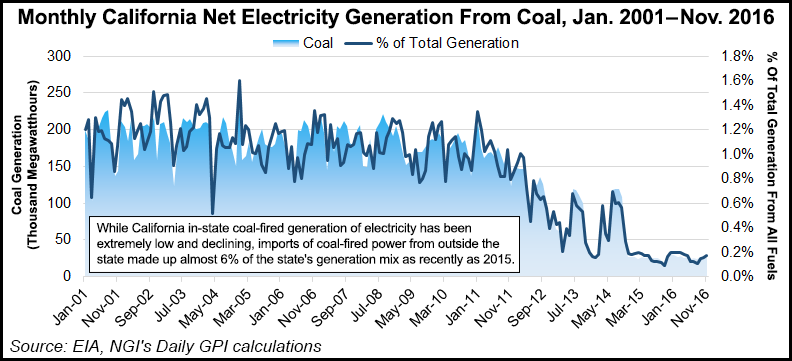Regulatory | NGI All News Access
California Coal Ban Possible Target For Trump Lawyers
While most analysts think it is a long shot, President Trump’s vocal promises to revive the U.S. coal industry could cause his administration to take a shot at reversing coal bans in California and several other western states under the theory that they violate the interstate commerce clause of the U.S. Constitution.

The recent decision of four utility owner/operators at the coal-fired Navajo Generating Station (NGS) in Arizona to close the plant at the end of 2019 has prompted concerns by newly installed Trump officials in the Interior Department who are looking for ways to extend the plant’s life. Removing California’s ban conceivably could help improve the economics of coal plants such as NGS on the Navajo Nation’s reservation at Page, AZ.
“Coal-fired electricity served about 11% of California’s power needs in 2000, dropped to less than 6% by 2015, and is expected to be zero by the middle of the next decade, while installed capacity of renewable resources more than tripled since 2001,” according to the 2016 state Integrated Energy Policy Report update approved earlier this month by the California Energy Commission.
Trump Interior officials reportedly have agreed to meet with the Navajo Nation leaders and other NGS plant stakeholders in March in Washington, DC, to determine what options might be available. California’s role as the West’s dominant electricity market and the market power of its electricity demand volumes and coal ban have throughout the West could be one of the topics, according to Chuck DeVore, a former California state lawmaker and official with the conservative Texas Public Policy Foundation.
“Interior officials and officials in the Bureau of Reclamation [a 24% owner of NGS] worked with local utility partners to extend the operating time frame for the station through 2019, which should give more time for all parties involved to develop options,” said DeVore, the nonprofit foundation’s vice president for national initiatives.
The foundation legal center, American Future, is in discussions on what role the foundation might play — either in the NGS talks or in challenging the California coal ban. At this point nothing has been decided. “We move very deliberately on our legal cases,” DeVore said.
The Los Angeles Timeson Monday published a front page report on the NGS decision to stay open three more years, and the growing pressures the Navajo Nation may put on the president because of his coal pledge. The report noted the irony surrounding the coal plant in which one Native American tribe is seeking Trump’s help at the same time as the controversy over Dakota Access Pipeline (DAPL), in which numerous tribes, led by the Standing Rock Sioux, are fighting presidential approval of the oil pipeline.
Analysts have pointed out that unlike the DAPL there is no easy fix the Trump administration can apply when it comes to the Navajo plant. Waiving environmental restrictions and subsidizing the Navajos to extend the life of the plant aren’t realistic options, and having the Bureau of Reclamation assume full ownership is not a political option agreeable to most of the conservatives within the new president’s inner circle.
“To keep it running into the future, the Trump administration would need to do something radical,” the Times‘ report said.
As an activist among various conservative groups pushing back against the nation’s growing anti-fossil fuel movement, DeVore is skeptical about the rationale by the four utilities involved in NGS. He thinks the next three years will be crucial for “understanding the full implications” of the coal-plant’s life not being extended and the constitutionality of California’s ban against renewing any coal-fired facility contracts.
“Members of the new Trump administration’s FERC might decide that stability of the Western [power grid] Interconnect and consumer [electricity] prices outweigh California’s desire to have clean electrons,” DeVore said.
© 2024 Natural Gas Intelligence. All rights reserved.
ISSN © 1532-1231 | ISSN © 2577-9877 |
